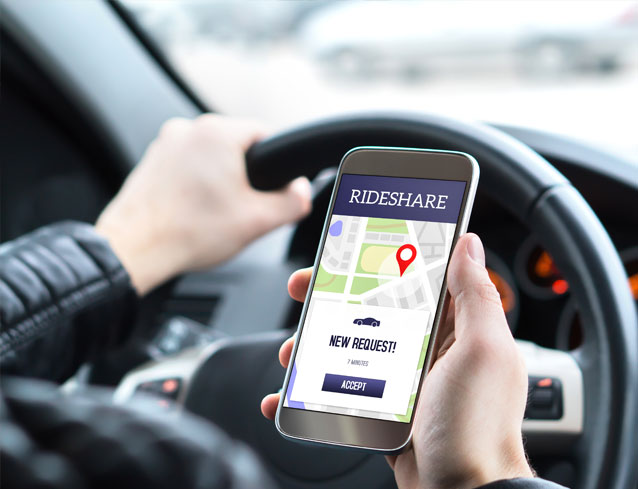
Uber, Lyft, and other companies that offer ridesharing services have revolutionized the personal transportation industry. Previously limited to traditional taxis, buses, subway rail, or other, more expensive options such as limousines, would-be passengers now can pull out their phone and, using an app provided at no-cost by the ridesharing service, order a car that usually appears in just minutes. Virtually unheard of just a few years ago, ridesharing services, including Uber, Lyft, and Sidecar, now serve almost every urban market in the country as well as many rural areas—not to mention various countries around the world. About 20 percent of Americans have reported using a ridesharing service. In general, they offer prompt service at a good price. But what happens to rideshare passengers whose trip ends in an accident?
That’s actually a difficult question to answer. Statistics on rideshare accidents—and thus on rideshare injuries and deaths—are virtually impossible to obtain. The companies don’t release them, and governments don’t collect them.
Fortunately, what is clear is that many people who are injured in ridesharing services are entitled to compensation for any injuries they sustain. This includes ridesharing passengers, other motorists, bicyclists, pedestrians, and anyone else who just happens to be in the wrong place at the wrong time. To find out if you have a claim, call our Georgia Ridesharing Accident Attorneys at Brauns Law Accident Injury Lawyers, PC today at (404) 975-1896 or contact us online.
Major Ridesharing Services Insure Their Drivers While on Assignment
Uber and Lyft both provide their drivers with liability insurance in the event they have an accident while their rideshare app is active. While the exact coverage varies depending on the circumstances, typically, people injured by ridesharing drivers who are running the app are covered. For Uber drivers, the policy covers driver liability up to $1 million. The insurance is in effect while a driver’s Uber app is on; the rideshare service also covers its drivers with an additional $1 million in liability insurance in the event of accidents involving uninsured drivers who are at fault. Lyft also provides its drivers with liability coverage while the driver has a passenger, with a policy limit of $1 million, and similar coverage for accidents with uninsured motorists who are at fault. Uber and Lyft offer this coverage, which applies to injuries suffered by passengers during a rideshare trip, in all 50 states. (Coverage is different in New York City because of local insurance laws and regulations.)
Rideshare services, including Uber, give their drivers advice on what to do when involved in a traffic accident. This advice also applies equally to anyone else involved in an accident, as well. Uber advises drivers to:
- Make sure that all parties involved in the accident are safe.
- Contact the police and emergency medical personnel.
- Contact the rideshare service for which the driver is working.
In addition to these steps, riders should do their best to document everything they can regarding the details of their rideshare accident. These critical steps can help protect you their rights later if there are disputes about liability.
Most ridesharing companies, including Uber and Lyft, offer relatively generous liability coverage for their drivers, against which injured passengers can file claims, but in the event of really serious injuries to passengers, even that coverage might not be enough. Uber and Lyft argue that their drivers are independent contractors and that the rideshare companies are not liable for their drivers’ actions, with the insurance coverage as the sole remedy for injured passengers. This is an attempt to limit riders’ ability to sue ridesharing companies for any damages they might suffer in rideshare accidents that exceed the insurance policy limits.
Rideshare Accident Injuries Are Just Like Other Traffic Accident Injuries
People who are injured in accidents caused by Uber or Lyft drivers can sustain extremely serious injuries. Some of the more common injuries sustained in these kinds of accidents include the following:
- Brain and head injuries are among the most common and severe injuries suffered in traffic accidents. Traumatic brain injuries can be relatively minor concussions or surface wounds, or they can be severe brain injuries that cause lifelong injuries that require continued care and result in permanent disabilities.
- Neck injuries also are extremely common in traffic accidents, ranging from muscle strain or whiplash, generally more minor and treatable and without long-lasting effects, to disc damage or dislocation, which can be more severe and require specialized treatment.
- Spinal cord injuries, yet another common accident injury, can result in paralysis or other loss of function, causing lifelong disabilities.
- Back injuries are frequent results of auto accidents because of the effects of sudden deceleration common in car crashes. These injuries can range from strains and sprains to herniated or ruptured discs, and even fractured vertebrae. Once again, these injuries have the potential to be severely debilitating over a long period of time, requiring extensive—and expensive—treatment and care.
- The forces involved in a car accident are violent and can throw your body around, as well as send broken glass and car parts flying, cause the car body to crumple into you, or cause the car to roll over. All sorts of injuries can result from these forces, including surface injuries to your face and the rest of your body. These injuries can be as minor as scrapes and bruises or as serious as severe lacerations and fractures, including major facial damage or dental injuries. Further, internal injuries are common, ranging from internal bleeding, broken bones, punctured lungs or major damages to various organs. These injuries can be life-threatening and certainly can result in long stretches of hospitalization.
Just as in any auto accident, a rideshare accident can leave anyone involved with major injuries through no fault of their own. Your damages could exceed even the seemingly generous liability policies provided by major rideshare services. If you are injured in such an accident, it would be wise to seek legal counsel to explore your options.
If You Are in a Ridesharing Accident, Consult a Georgia Accident Lawyer as Soon as Possible
At Brauns Law Accident Injury Lawyers, PC, we often represent clients who are injured in accidents involving rideshare services such as Uber or Lyft. We are committed to ensuring that our clients get the compensation they deserve and are not afraid to go up against large the large insurance companies used by ridesharing services. If you have been involved in an accident caused by an Uber or Lyft driver, you can contact Brauns Law Accident Injury Lawyers, PC at 404-418-8244 or through our online contact form.

